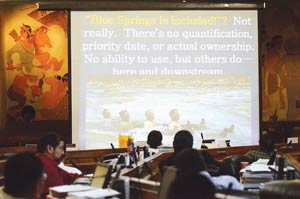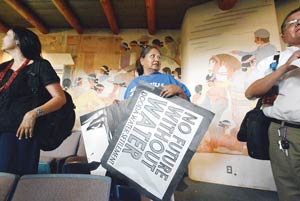Leaders mum on next step in water debate
By Marley Shebala
Navajo Times
WINDOW ROCK, June 28, 2012



(Special to the Times - Donovan Quintero)
TOP: Legislative branch staffer Harold Morgan stops to look at Navajo Times cartoon regarding the water rights settlement held by a protester June 22 outside the Navajo Nation Council Chambes in Window Rock.
SECOND FROM TOP: Legislative staffer Harold Morgan rings the bell, which marks the start of the Naa'bik'iyati Committee meeting June 22 in Window Rock.
THIRD FROM TOP: A history of water rights is depicted in a slide show June 22 during the Naa'bik'iyati Committee meeting in Window Rock.
FOURTH FROM TOP: Nisi Jimmie, from Low Mountain, Ariz., holds her protest signs June 22 at the Naa'bik'iyati Committee meeting in Window Rock.
Late Tuesday afternoon, Naize announced in a press release that the special session to vote on the settlement scheduled for Wednesday was canceled.
He stated that the meeting was canceled indefinitely because not enough delegates had signed a petition calling for the special session.
But that's only partially true.
On Tuesday morning, Delegate LoRenzo Bates (Nenahnezad/Newcomb/San Juan/T'iistoh Sikaad/Tse'Daa'Kaan/Upper Fruitland) said tribal law mandates that the Council's Naa'bik'iyiti Committee must recommend a proposed agenda for Council sessions.
Since the committee met and adjourned on June 22 without recommending a agenda another committee meeting would have to be called to recommend an agenda. Otherwise, the Council cannot convene without an agenda, he said.
He added that the committee's failure to recommend an agenda was a "manipulation" of tribal law to circumvent any Council action on the water settlement.
But Bates said it would be up to Naize to decide what to do.
When the Naa'bik'iyiti Committee met on June 22, the delegates voted down a bill to approve the water settlement with a vote of 3 in favor and 15 opposed.
Committee members noted that that they were willing to continue negotiations.
Naize, who sponsored the water bill, was among the 15 committee members voting "no."
He announced his sponsorship of the water settlement bill during a June 9 press conference.
Naize explained that his sponsorship was intended to get all parties concerned into a dialogue.
The three committee members who supported the water bill on June 22 were LoRenzo Bates (Nenahnezad/Newcomb/San Juan/T'iistoh Sikaad/Tse'Daa'Kaan/Upper Fruitland), Charles Damon (Baahaali/Chilchiltah/Manuelito/Red Rock/Rock Springs/Tsayatoh) and Andrew Simpson (Becenti/Crownpoint/Huerfano/Lake Valley/Nageezi/Nahodishgish/Standing Rock/Whiterock).
Prior to the committee's June 22 two-hour debate over the water bill, the committee heard reports from U.S. Interior Department officials and Jack Utter, a Water Code Administration employee who represented the Diné Water Rights Committee, a group of grassroots organizations.
Dion K. Killsback, counselor to acting U.S. Indian Affairs Assistant Secretary Donald Laverdure, said the federal officials were in attendance to answer questions about the proposed water rights settlement.
Utter's report was a historical review that included serious allegations against tribal water rights attorneys and the tribal Department of Justice.
The committee's vote to accept the Interior report was 0 in favor and 16 opposed.
Utter's report received a 14 in favor and 0 opposed vote.
On Tuesday, Attorney General Harrison Tsosie responded to allegations made by Utter.
"Jack Utter's baseless allegations before the Naa'bik'iyati have been repeatedly debunked by legitimate authorities on Indian water issues," Tsosie said. "Members of the Navajo Nation are intelligent people who will see through this nonsense much like they did in 2002 when a special subcommittee of the Navajo Nation Council held hearings and rejected his groundless arguments. We will not dignify his theories with a response."
On June 15, the Naa'bik'iyiti Committee voted unanimously to recommend to the Council that they oppose Senate Bill 2109 and House Bill 4067, which both contain the proposed settlement.
Council Delegate Katherine Benally (Chinchilbeto/Dennehotso/Kayenta), who sponsored the bill opposing SB 2109, introduced her bill with an emotional plea.
"We cannot be failing out knees to Congress," Benally said. "First of all, this land was ours anyway. It belonged to us and I believe that is what we call our aboriginal rights."

